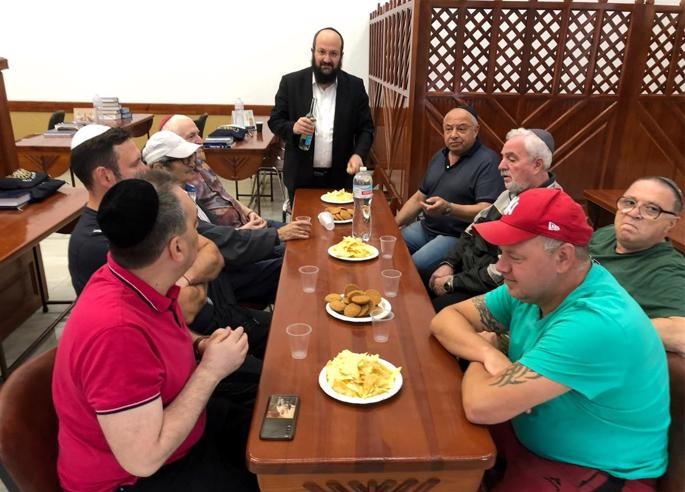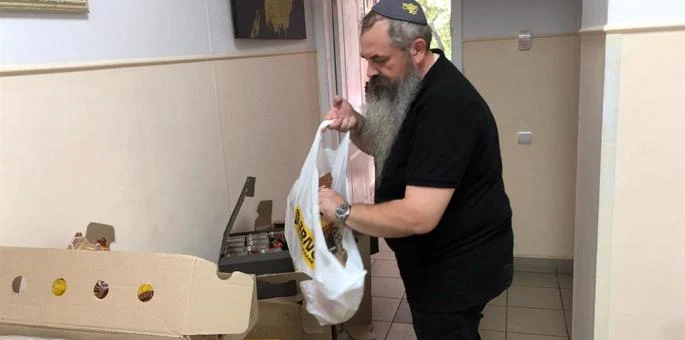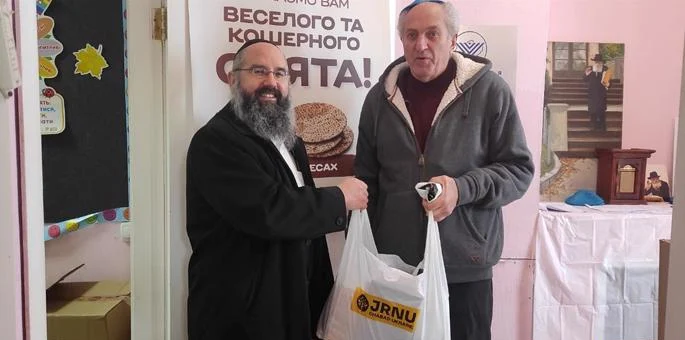.jpg)
In the City of Sumy, located just 12.5 miles from the front line, Rabbi Yechiel Levitansky is balancing the demands of a humanitarian crisis with the needs of his community. Surrounded by the sounds of nearby explosions, and often without electricity or running water, over the past few weeks he organized Rosh Hashanah services, shofar-blowing routes, holiday meals and the distribution of food packages.
“We are constantly under fire. Explosions are a regular part of life here,” says Levitansky before the electricity in his home cut out mid-sentence. Levitansky and his wife, Rochi, have lived in Sumy since 2004, transforming the small Jewish community into a flourishing center of Jewish life with a kindergarten, a synagogue, and a mikvah.
“But since the crisis broke out in 2022, our lives have drastically changed,” he said. “We were under siege during the early weeks of the war, and many families fled. Our kindergarten had to close. We turned it into a humanitarian aid hub—distributing food, batteries, clothing and medicine.”
Now, with the High Holidays upon them, their focus shifts to hosting holiday meals for the community, despite the ever-present danger.
“With inadequate bomb shelters and the front line so close, the circumstances are challenging,” says Levitansky. “But nothing stops Rosh Hashanah in Sumy.”
One local resident described the vital role the Jewish community serves: “We always have them to turn to, no matter what’s happening. We receive daily hot meals, warm clothing and blankets, and when the city had no power for 30 hours last week, we were comforted by the emergency lights and battery packs that Rabbi Levitansky handed out.”
In Kropyvnytskyi, a central Ukrainian city that is home to many refugees, Rabbi Dan Zakuta has also been busier than usual.
“Though we’re not directly in the havoc zone, our city has been filled with families who fled harder-hit areas,” he says. “Some came with nothing but the clothes on their backs. They need both physical help and spiritual support.” Home to about 2,000 Jews, the community has changed dramatically since the crisis began. “Many left, but some have returned—finding life as a refugee even more difficult. Now, we’re helping people from all over Ukraine who have moved here.”
Like his counterpart in Sumy, Rabbi Zakuta worked tirelessly in the weeks leading up to Rosh Hashanah distributing food, planning prayer services, arranging shofar-blowing and organizing holiday meals.
And in Kremenchug, Rabbi Shlomo Salamon was doing the same things, for the fourth year in a row: “Just a few days ago, we heard 25 explosions nearby,” he said. “A bridge in our city was blown up. Travel has become nearly impossible. Our Hebrew-school teachers are stuck on the other side with no safe route to reach us, but we’re trying everything to reopen.”
Rabbi Salamon and his family serve a community of 1,000 Jews: “We prepared honey cakes, food packages and shofar-blowing for everyone we can reach,” he says. “When you see how much people rely on you, you find the strength to keep going.”
For Yuri Sovolyv, a longtime Jewish resident of the city, the Salamons are a lifeline: “They haven’t left us. Their dedication has only grown. The Salamons are a guiding light—nothing is too difficult for them.”
It has been a privilege for JRNU to facilitate and support the incredible work being done throughout Ukraine, by leaders, staff and volunteers, ensuring that all the Jews of Ukraine are able to celebrate the holidays, leaving no one alone or forgotten. Together we save lives and restore hope.
Based on an article by Chaya Ohana | Chabad.org



